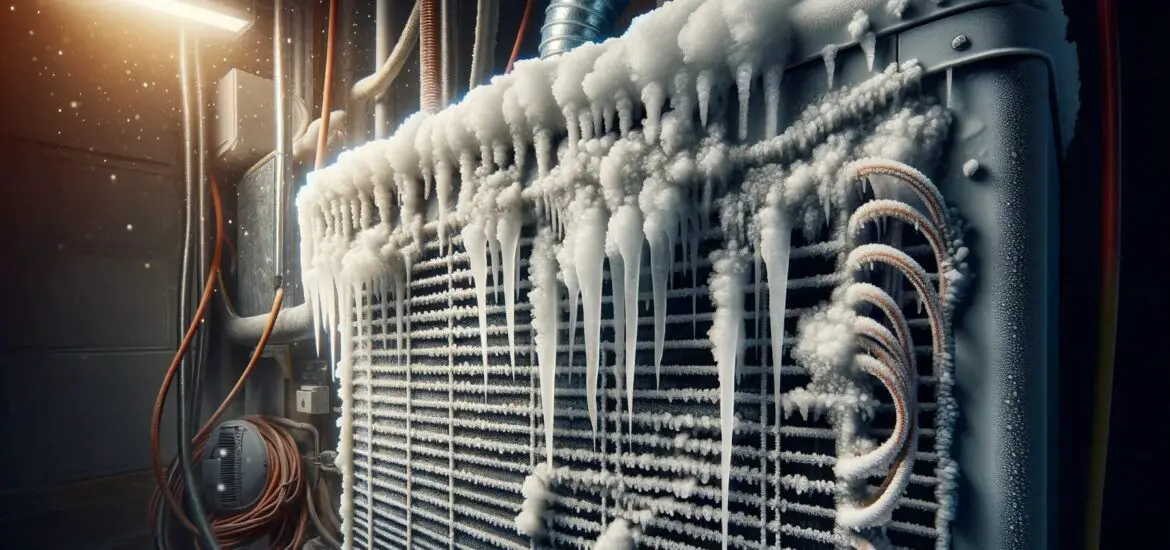In this guide, you’ll learn what happens when freon leaks from an air conditioner, the associated health risks of a leak, and how to identify a freon leak.

Table of Contents
What Happens When Freon Leaks from an Air Conditioner?
When Freon leaks from an air conditioner, you might experience several swift and problematic changes:
Decrease in Cooling Power
Freon, a refrigerant, is crucial for the heat exchange process that cools your home. A leak reduces the amount of Freon, causing your system to struggle to cool the air. You’ll notice the air conditioner running longer cycles, yet the interior doesn’t reach the desired comfort level. This inefficiency can manifest as uneven cooling, with some areas remaining warm.
Rising Energy Costs
As the air conditioner loses efficiency, it compensates by running more frequently and for longer periods. This excessive operation leads to a spike in energy consumption. This is often reflected in your utility bills. If your bills increase without a change in usage habits, it could signal a Freon leak.
Potential Compressor Damage
The compressor relies on a sufficient charge of Freon to operate correctly. With a leak, the Freon levels drop. This, in turn, causes the compressor to overheat and work without proper lubrication.
The potential result of such an occurrence is premature compressor failure. Since the compressor is one of the most expensive parts of an AC system, its failure can necessitate significant repairs. In some cases, it might require complete system replacement.
Environmental Concerns
Freon can be harmful to the environment. It contributes to ozone depletion and global warming when released into the atmosphere. Therefore, it’s important to address leaks promptly. This is done not only for your household but also to mitigate environmental damage.
Health Risks Associated with Freon Leaks
Freon leaks can pose several health risks, especially if the leak is substantial or if the space is poorly ventilated:
Respiratory Distress
Breathing in Freon can lead to a variety of respiratory issues.
Minor exposure often results in discomfort such as throat, nose, and eye irritation. However, in higher concentrations, it can cause more severe symptoms like shortness of breath and coughing. Some people might even get chemical burns in the lungs.
Prolonged exposure in a confined space can lead to serious conditions like pulmonary edema. This condition can be fatal without immediate medical attention.
Systemic Toxicity
Chronic exposure to Freon, particularly in high amounts, can be toxic to internal organs. This toxicity occurs because Freon can displace oxygen in the air. This can lead to asphyxiation or other serious health issues over time.
Dermal and Ocular Harm
Direct contact with Freon, particularly in liquid form, can cause severe skin and eye damage. Due to its low boiling point, Freon evaporates quickly. As a result, it can potentially cause frostbite-like injuries upon contact with skin or eyes. This is a risk during handling of the substance without proper equipment.
Identifying a Freon Leak in Your Air Conditioner
Timely detection of a Freon leak is critical to prevent the above effects. Be aware of the following signs:
Audible Leak Indicators: A hissing or bubbling noise might indicate that Freon is escaping from the AC unit. These sounds can arise from leaks in the refrigerant lines, coils, or the compressor itself.
Ice Formation: Ice buildup on the evaporator coils or refrigerant lines can signify a Freon leak. When there isn’t enough refrigerant to absorb heat, the remaining liquid refrigerant can become too cold. This can cause condensation and subsequent freezing on the coils.
AC Performance Issues: Additional signs are ineffective cooling and frequent turning on and off (short cycling). As the refrigerant level drops, the system cannot maintain the set temperature. This usually leads to performance issues.
Professional Diagnosis: The most definitive method for identifying a Freon leak is through a professional inspection. HVAC technicians use specialized tools like electronic leak detectors, ultraviolet dyes, or nitrogen tests to locate and quantify the leak accurately.